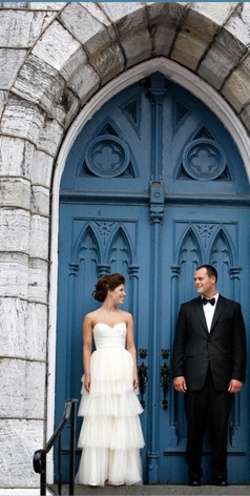Where to start, what forms to file and who to talk to; this is WeddingsOnline.ie guide to getting married in Northern Ireland.
Youâve got the groom, youâve got your eyes on the dress of your dreams and the date is set, now the fun begins. Well...itâs not fun so much as plain mandatory. The legalities of marriage are not exactly riveting, but are one of the necessary steps in your road to ‘I doâ. If you are getting married in Northern Ireland, here is everything you need to know!
Before you start filling out forms, you need to decide what kind of ceremony you would like. The choices are simple; you can have a religious ceremony or civil ceremony. The preliminaries and basics are the same for either ceremony, but there are variations.
Religious Ceremony
You can choose to have any priest, pastor or minister perform your ceremony, as long as they are registered as an Officiant with the Registrar General. ‘A couple wishing to have a religious ceremony should consult with the Officiant and agree the date and venue. A religious ceremony may, with the agreement of the Officiant, take place anywhere in Northern Irelandâ, according to the Registrar General website, www.groni.gov.uk.
Civil Ceremony
A civil ceremony can ‘only be solemnized by the Registrar or Deputy Registrar for the District in which it is to take place.â The ceremony has to take place in either the Registrarâs Office or an approved venue (a complete list of approved venues is available on www.groni.gov.uk). One of the first things you should do after you have chosen a venue is to make arrangements with the Registrarâs office, as certain times of the year are very popular and availability is limited.
While nothing religious may be said during the ceremony, you may have songs and poetry as well in the service. You should discuss the order of the ceremony with the Registrar in advance.
Marriage Notification Form
After you decide which type of ceremony you want, you need to file a Marriage Notification Form and submit the other documents to the Registrarâs Office. ‘Normally notices should be with the Registrar about EIGHT weeks before the marriage but if either of you have been married before, the notices should be with the Registrar TEN weeks beforehandâ. The minimum period in which you can give notice is 14 days before the marriage. If you are having a religious ceremony, your Officiant will need to fill out part of your notification form.
Along with the notification form, you will need to prove your age, nationality and identity with a birth certificate and passport. If either of you were married before you need to prove your divorce or produce the death certificate of the deceased former spouse. ‘If time is getting short it is better to give notice first and then pass the documents to the Registrar when they become available. Provided the documents, are in order the marriage can proceed as arrangedâ (groni.gov.uk).
Marriage Schedule
After you have filed your Marriage Notification Form and other documents and the Registrarâs Office is satisfied, they will issue a Marriage Schedule. The Marriage Schedule is the most important document to have, without it, you cannot get married. If you are having a religious ceremony, you will be advised when you can collect your Schedule, which wonât be available more than 14 days before the wedding. You will need to collect it in person at the Office, and it will need to be signed by both partners and the Officiant at the ceremony, and then returned to the Registrar within three days. If you are having a Civil Ceremony, the Registrar will bring the Marriage Schedule to the ceremony, but make sure you verify this prior to the service.
Foreign Marriages
If you are an EU or British citizen or if you hold a certificate of entitlement to abode in the UK, you will not be subject to Immigration Control. For a full list of who is subject to immigration control, you can contact your nearest British Embassy or the UKâs visa information site. ‘However, if you are subject to immigration control, before you can give notice of marriage in Northern Ireland you must obtain either a marriage visitorâs or a fianc�âs visa or a Certificate of Approval.â The Certificate of Approval may only be filed by someone already abiding in the UK.
If you are getting married outside Northern Ireland or the Republic of Ireland you will need to complete the marriage legalities in that country. If the country needs prove you are free to marry you can file a Marriage Notification form to get a Certificate of Legal Capacity to Marry. ‘Although foreign marriages cannot be registered in Northern Ireland, you may wish to lodge your foreign marriage certificate with the General Register Office in order to obtain a copy of your marriage certificate in the future.â You can file for your marriage certificate at a British Embassy or Consulate or wait until you return to Northern Ireland and file with the Foreign and Commonwealth Office in London.
Fees:
Notice of Marriage �15.00 (each person)
Solemnization of civil marriage in Registrar's Office Monday to Friday 9.00am to 5.00pm �25.00
� Monday to Friday 5.00pm to 8.00pm �112.00
� Saturday 9.00am to 5.00pm �112.00
� Sundays, Bank Holidays and all other times (except those mentioned above) �150.00
Certified Copy of a Marriage Registration �12.00 If obtained at time of Registration or Entry Number supplied �6.00
For more information:
General Registrarâs Office- www.groni.gov.uk
UK Visaâs Office- www.ukvisas.gov.uk
UK Border Agency- www.bia.homeoffice.gov.uk
Image by www.artoflove.com
Like this?




















































































































Comments
Have something to say about this article? Leave a comment!